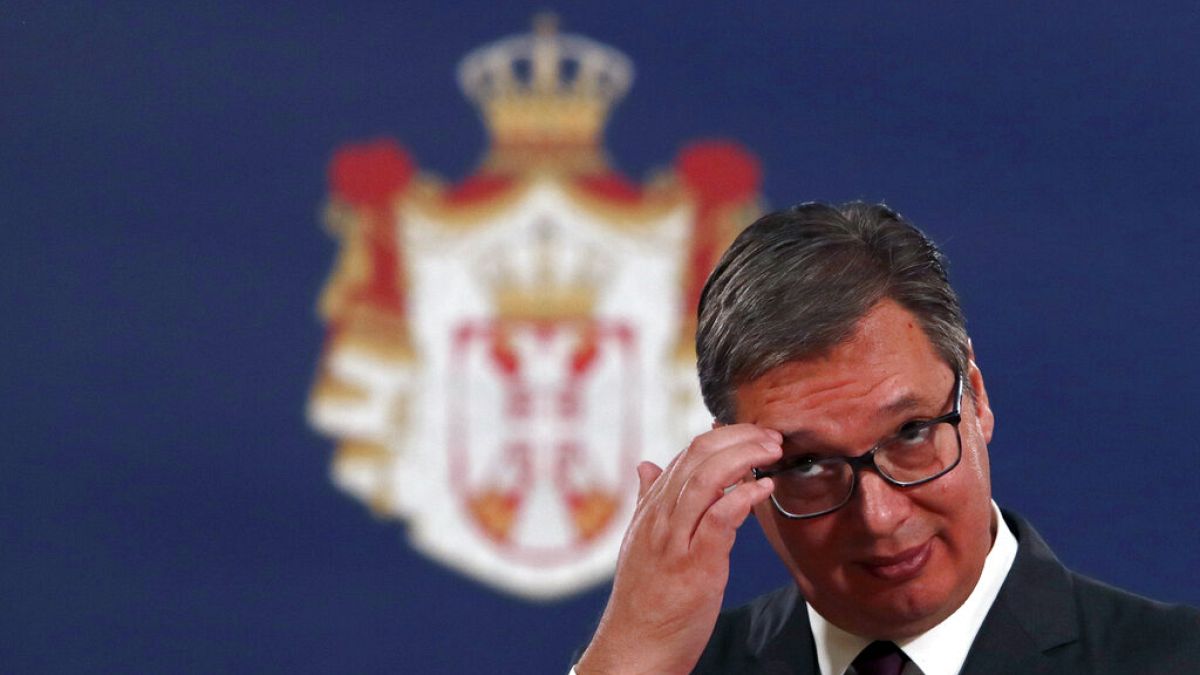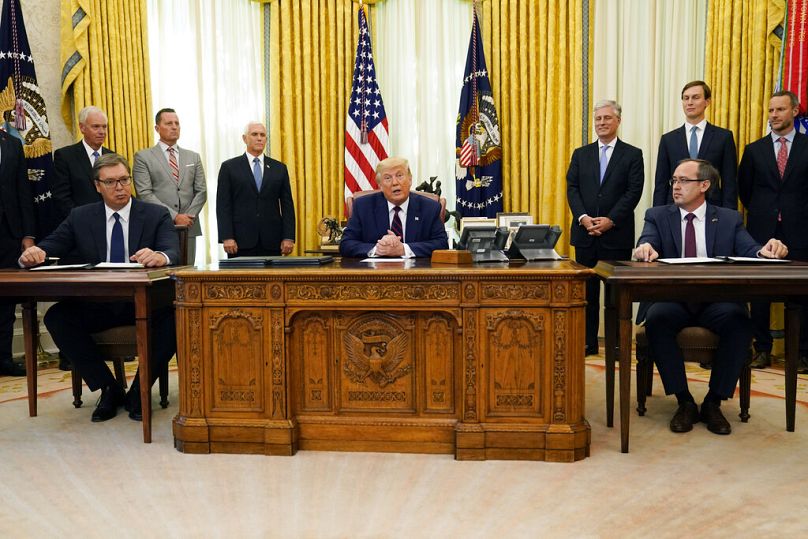Serbia's Aleksandar Vucic had a friend in President Donald Trump. With Joe Biden, life may not be so easy.
The fallout from the US election of November 8, 2016 was substantial, and many emotional responses across the globe hovered between anger and denial. But in Belgrade it was not grief that the Serbian political elite felt as Donald Trump beat Hillary Clinton to the White House, it was joy.
“The perception was that the unthinkable had happened,” said Jasmin Mujanovic, a political scientist and co-host of the podcast Sarajevo Calling.
“An American president had been elected who was himself a nationalist and a chauvinist and a xenophobe, [and] had run on a platform of seemingly wanting to upend and subvert, in its entirety, American foreign policy. They really thought: ‘This is a guy we could reach out to’.”
Four years later, on September 4, 2020, that expectation paid off. Serbia’s president, Aleksandar Vucic, was at the White House signing deals with Kosovan Prime Minister Avdullah Hoti that would see the two nations - which fought a war in 1998 - restore economic ties, stopping short of forcing Serbia to recognise Kosovo, which declared independence in 2008.
It was a win for Belgrade, which has been pressured for two decades to accept an independent Kosovo, not least by the European Union, which has made it a condition of Serbia’s joining of the bloc. Trump, and his envoy Richard Grenell, did not require Vucic to cross that Rubicon. Vucic got the pomp and ceremony of a White House peace deal, but without the peace.
Serbia and Kosovo have not actually been at war for 20 years, despite Trump’s comments about there having been “tremendous death over a long period of time”. But very real disputes over the Serbian-majority northern territories of Kosovo were also not part of the deal, which, in terms of what was actually agreed, was the equivalent of pushing an open door.
“I don’t know that anyone believes that it has any sort of merit whatsoever, Mujanovic said. “What they agreed to is a small number of economic plays, there’s certainly not anything worthy of a visit to the White House.”
At one point during the press conference between Trump, Grenell, Vucic, Hoti, and Grenell, the U.S. president went off on a trademark tangent, began talking to Vucic about Novak Djokovic, the Serbian tennis star, and then the number of Serbs in the American basketball league.
“They’re all as tall as you are,” Trump said, turning to Vucic, “even a little bit taller, maybe.”
As bizarre as the whole affair was, it was still a White House meeting and one that Serbia had worked hard to get. Belgrade had pulled every string they could find since 2016, reaching out to Trump’s entourage in Washington. In an unrelated but nonetheless prominent diplomatic coup in 2019, Tiffany Trump, the president’s youngest daughter, visited Belgrade for Spring Break.
Little surprise, then, that in the run-up to the election on November 3, Vucic was openly rooting for Trump. His ally Bosnian Serb leader Milorad Dodik went even further, calling Biden a “Serb hater” and urging Serbian-Americans to vote for Trump. That it was Biden that ultimately won the White House - even if Trump is yet to accept it - is bad news for Vucic and his allies.
”Certainly, the victory of Biden is a blow to Vucic,” said Florian Bieber, an analyst at The Centre of Southeast European Studies of the University of Graz. “[Vucic] has been betting on the transactional approach on the dispute with Kosovo and also a US administration that did not honour long-established alliances, including the support for Kosovo.”
Prime minister of Serbia from 2014, Vucic was elected president in 2017, running on a populist platform that included a commitment to European accession. As leader, he has reached out to both Brussels and Moscow, visiting the Russian capital for talks with Vladimir Putin in 2017 and pledging that Serbia would never agree to sanctions on Russia.
But critics say that Serbia under Vucic has become increasingly autocratic, with press freedom declining markedly since he became prime minister in 2014 and a rise in physical attacks on political opponents. In 2018, an attack on the leader of the Serbian Left Party, Borko Stefanovic, sparked the largest protests in Belgrade since the fall of Slobodan Milosovic.
In June 2020, Serbian opposition parties boycotted elections over concerns about whether the vote would be free and fair, especially given the COVID-19 pandemic. As a result, Vucic’s Serbian Progressive Party won 188 of 250 seats in parliament. Under pressure from the EU, Vucic has pledged to hold new parliamentary elections by April 2022.
Vucic has said publicly a number of times that he no longer believes the right-wing nationalist ideologies of his youth, including the concept of a Greater Serbia that would encompass northern Kosovo, parts of Croatia, Montenegro, and Republic Srpska, the Serbian majority statelet in Bosnia & Herzegovina that was created out of the 1995 Dayton Accords.
But his neighbours are not so sure. After the pro-Serbia opposition swept to power in Montenegro - which declared independence from Serbia in 2006 - in August 2020, Montenegrin President Milo Djukanovic accused Vucic of manipulating a row over Serbian Orthodox Church property to encourage the movement that sank his government.
"Belgrade's official policy, and that even the blind could see, was to try to create an atmosphere in which Montenegro would become a part of the Serb world,” Djukanovic said.
In Bosnia, Vucic is an ally of the aforementioned Dodik, who has openly said he wants to see the Serb-majority province breakaway from Bosnia & Herzegovina, effectively unravelling Dayton, the U.S.-brokered peace deal that ended the war in Bosnia. For this, Dodik has been sanctioned by the U.S. Treasury Department.
With the election of Biden, Vucic has replaced a president who would likely struggle to point out Bosnia on a map with one who was intimately involved in ending the wars in Bosnia, and - as a U.S. senator - backed the 1999 bombing of Serbia that brought to an end the conflict in Kosovo. Biden is seen as “sympathetic” to both Sarajevo and Pristina.
“No American president has ever been as intimately familiar with the region as Joe Biden is,” said Mujanovic. “In that sense, it is a bad position to be in if you are Aleksandar Vucic.”
Providing Biden has time for a substantive foreign policy given the COVID-19 pandemic and the bitter political divide that the November election once again exposed in America, it is likely that - unlike Trump - he will not be willing to sideline European nations in his negotiations with Belgrade. When it comes to Kosovo, that could be particularly bad news for Vucic.
“It will be bad news for Vucic if [Biden and European states] coordinate in pressuring him to recognise Kosovo without offering any concessions that he can sell to his domestic constituency,” said Vuk Vuksanovic, at the London School of Economics’ foreign policy thinktank, LSE IDEAS.
That said, even with Biden in the White House it is likely to be the U.S. that takes the lead on future relations between Serbia and Kosovo rather than the European Union, Vuksanovic said. The EU has lost credibility in the region since Bulgaria vetoed talks between Brussels and North Macedonia, and although accession for Serbia is theoretically on the cards, it is looking increasingly remote given the reservations of leaders such as France’s Emmanuel Macron.
“Without viable enlargement perspective, the EU has no leverage in the region,” Vuksanovic said.
But a Biden victory isn’t all about Kosovo. The rise of Trump was important for Vucic in the same way that it was important for other right-wing populist or governments in Europe perceived as authoritarian including Poland, Slovenia, and Hungary. It popularised and legitimised a nativist, nationalist political rhetoric and the ability to say what would previously have been taboo.
“It certainly is a blow to populists in Europe, including the Western Balkans. This is the case both as Trump helped as a role model and justification and also as his foreign policy did not promote and favour liberal democracies,” said Bieber.
For Mujanovic, that is key. Serbia is not Hungary and Vucic is not Orban. He may be able to project power in the Western Balkans, but Serbia is a small, poor country and does not have the economic or political might for Vucic to be a player on the world stage. It wouldn’t take much from the White House, says Mujanovic, to put Aleksandar Vucic 'back in his box'.
“Vucic can throw his weight around in the Western Balkans because the whole region is like that, it is marginal and poor, and Serbia is the ‘big dog’, but not economically. Its economy is smaller than Slovenia and Croatia,” he said.
“In that sense, he has got too big for his britches and a little bit of pushback from the Americans - let alone the Europeans - would go a very long way.”
Every weekday at 1900 CET, Uncovering Europe brings you a European story that goes beyond the headlines. Download the Euronews app to get an alert for this and other breaking news. It's available on Apple and Android devices.



